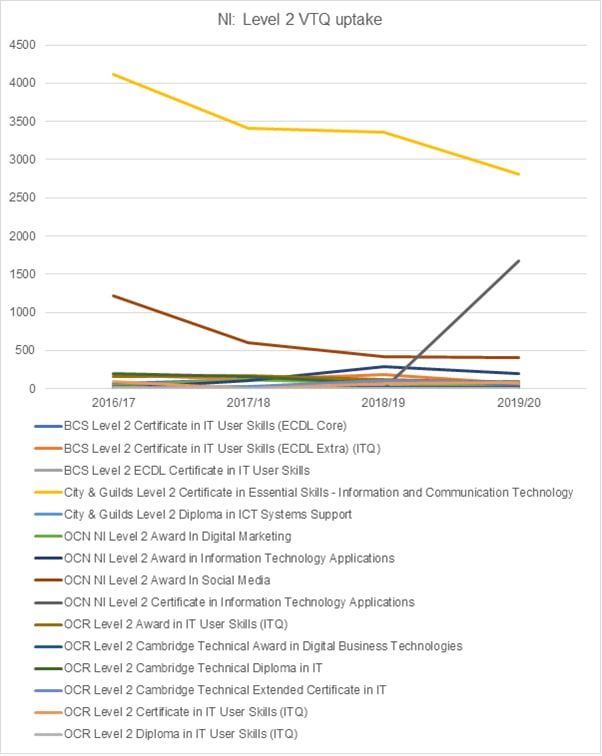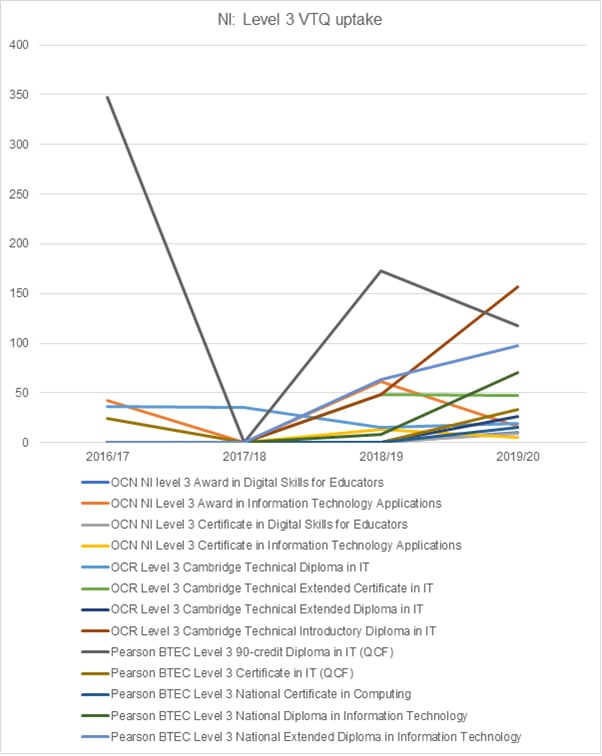Northern Ireland: Vocational and Technical Qualifications in Computing at the end of Key Stage 4 and 5
Northern Ireland uses the same regulatory framework as England (Ofqual), there are 215 vocational qualifications related to ICT and digital skills currently registered. These are offered by 23 different awarding organisations. Of the 215 registered awards, only 28 registered one or more student receiving that award in 2020. The currently active awards are set out in Annex 5.
All of the relevant data can be accessed here:
- Department for the Economy, Further education sector activity in Northern Ireland: 2015/16 to 2019/20
- Council for the Curriculum, Examinations & Assessment, Technical and Professional Qualification Bulletins
In 2020, the three most popular Level 2 and Level 3 awards were as follows:
| Award | Number |
|---|---|
| City & Guilds Level 2 Certificate in Essential Skills - Information and Communication Technology | 2814 |
| OCN NI Level 2 Certificate in Information Technology Applications | 1679 |
| OCN NI Level 2 Award in Social Media | 412 |
| OCR Level 3 Cambridge Technical Introductory Diploma in IT | 157 |
| Pearson BTEC Level 3 90-credit Diploma in IT (QCF) | 118 |
| Pearson BTEC Level 3 National Extended Diploma in Information Technology | 98 |
Further education data suggests that in 2019/20, 10,245 students also took a qualification (all levels) in ICT. This figure is 29% lower that the figure in 2015/16.
In 2020, the equivalent GCSE and A-level entries were 7,381 and 2,255 respectively in Northern Ireland.
The following charts show the VTQ uptake across five years in Level 2 and 3 qualifications. It is not possible to determine any patterns in the uptake separately by males and females.


Some context
As in the other nations of the UK, young people gain experience of digital skills and digital making in their earlier years to provide a platform that supports specialisation at key stage 4 and beyond. The publication of the Lords Select Committee report on the UK’s digital future in 2015[41] informed the reform of the curriculum offer and associated qualifications in Northern Ireland[42].
This appears to have driven a shift from using software and applications to ‘more technical aspects of computing’ (ibid). The variety of VTQs on offer is extensive, although few receive substantial entries and add little to the numbers pursuing similar qualifications in school. The notable exception is the ICT-based level 2 award, which although declining over the period examined, still attracts almost 3,000 students, possibly indicating a resilient interest in digital skills applied to a range of work settings.
CCEA has analysed the issue of low female participation in computer-focused choices at key stage 4 and beyond[43], concluding that many of the reasons are common to STEM subjects in general and that lessons should be looked for and adopted from other outside of Northern Ireland. These findings are reflected in the recent work of Cavaglia et al[44], who emphasise how important role modelling (peers, mentors, and teachers) can be.
At the time of writing, both the Department for the Economy is preparing a new skills strategy for Northern Ireland that will emphasise the place of digital skills in the education and training system and in the economy.[7]













